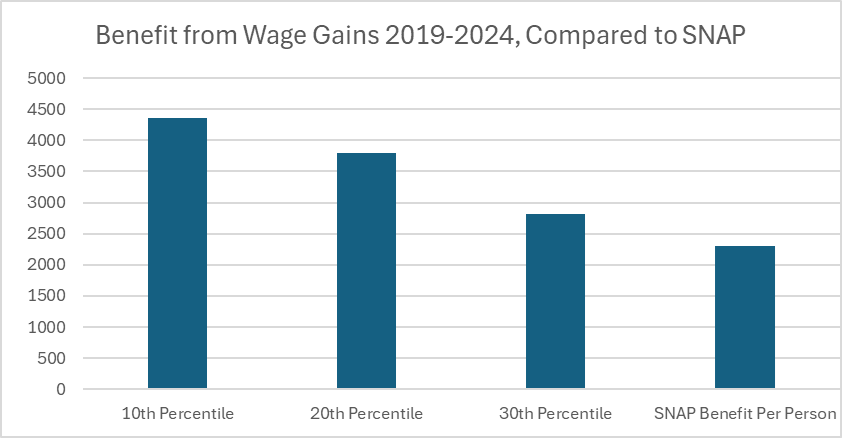There has been much reporting this week on the harm that will be done to many low and moderate-income families from Republican plans to cut benefits in the Supplemental Nutrition Assistance Program (SNAP). The Republican plans seem to center largely on creating bureaucratic obstacles that will make it more difficult for many families to claim and keep benefits.
These plans, if allowed to go into effect, will mean serious hardship for tens of millions of families over the next decade. However, it is striking to contrast the concern over these benefits with the lack in interest in the rise in real wages for low-wage earners since the pandemic.
According to data from the Economic Policy Institute, workers at the tenth percentile of the wage distribution saw a 15.3 percent increase in their real wage from 2019 to 2024. Workers at the 20th percentile had an increase of 11.4 percent over this period. Just to be very clear, these are increases in real wages, which means above the inflation we saw over this period.
These increases are a really big deal. Over much of the last half-century real wages at the bottom of the wage distribution barely rose at all and there were many years where they actually fell, so increases like this are the exception.
The two big factors behind the rise are the extraordinarily tight labor market in the Biden years. We had the longest stretch of below 4.0 percent unemployment since the 1950s. A tight labor market strengthens workers’ bargaining position, especially for those at the lower end of the wage distribution.
The other factor was a higher minimum wage. While the federal minimum wage remains frozen at its 2009 level of $7.25 an hour. Many large progressive states, like California, New York, and Illinois have raised their minimum wages over this period, as have some cities like Seattle and San Francisco. Research shows that these wage hikes benefited millions of workers while having a minimal effect on employment.
The rise in real wages over this period made a large difference in the lives of tens of millions of workers in low paying jobs. For a worker at the tenth percentile putting in a full-year (50 weeks) at a forty hour a week job, the increase in real wages came to $4,360 over the course of year. For a worker at the 20th percentile of the wage distribution the gain was $3,810 over the course of a year. By contrast, the average SNAP benefit came to $2,304 in 2024.
Source: Economic Policy Institute, 2025.
To be fair, many workers are unable to work 40 hours a week either because their job doesn’t give them 40 hours of work or their health or family responsibilities (did anyone say “childcare?”) prevent them from working at a full-time job. Also, many workers will be receiving SNAP benefits for dependent children, so this is not entirely an apples-to-apples comparison.
Nonetheless, the extraordinary increase in real wages for low-paid workers in the Biden years was a big deal. Unfortunately, it got very little attention in the media and in public debate. Hopefully people have learned the lessons about the benefits of full employment and this will continue to be a major policy goal in future years.




With this data, it seems hard to claim the southern border was a problem.
Agreed. The Biden admin's focus on the "middle out and bottom up" economic vision was a great success.
This was of a piece with the general thrust of his Presidency, an attempt to recreate an idealized version of our history, namely the post WW2 Keynesian consensus. It also doomed his 2024 campaign from the start. Bipartisanship was never going to be resurrected. Those days are gone.
Tariffs, increased administrative burdens on transfer payment recipients and the general disdain of those not wildly wealthy by the current administration will reverse the Biden era gains.
On that note of recreating an idealized past - a habit of old men, like both Biden and Trump - is the current admin's drive to recreate the world of great power politics and oligarchs from the pre WW1 period.
Like Biden's dream, Trump's too is dead on arrival.
Choosing Saudi Arabia over Japan and Europe, consistent with that pre WW1 vision, is a huge error. Betting big on LLM rewriting our laws to create undiscovered efficiencies is the bubble waiting to burst.
And then there's Crypto.